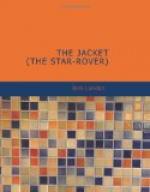“That is the way with all of them—won’t come across with the goods,” was Oppenheimer’s criticism. “My mother believed in spirits. When I was a kid she was always seeing them and talking with them and getting advice from them. But she never come across with any goods from them. The spirits couldn’t tell her where the old man could nail a job or find a gold-mine or mark an eight-spot in Chinese lottery. Not on your life. The bunk they told her was that the old man’s uncle had had a goitre, or that the old man’s grandfather had died of galloping consumption, or that we were going to move house inside four months, which last was dead easy, seeing as we moved on an average of six times a year.”
I think, had Oppenheimer had the opportunity for thorough education, he would have made a Marinetti or a Haeckel. He was an earth-man in his devotion to the irrefragable fact, and his logic was admirable though frosty. “You’ve got to show me,” was the ground rule by which he considered all things. He lacked the slightest iota of faith. This was what Morrell had pointed out. Lack of faith had prevented Oppenheimer from succeeding in achieving the little death in the jacket.
You will see, my reader, that it was not all hopelessly bad in solitary. Given three minds such as ours, there was much with which to while away the time. It might well be that we kept one another from insanity, although I must admit that Oppenheimer rotted five years in solitary entirely by himself, ere Morrell joined him, and yet had remained sane.
On the other hand, do not make the mistake of thinking that life in solitary was one wild orgy of blithe communion and exhilarating psychological research.
We had much and terrible pain. Our guards were brutes—your hang-dogs, citizen. Our surroundings were vile. Our food was filthy, monotonous, innutritious. Only men, by force of will, could live on so unbalanced a ration. I know that our prize cattle, pigs, and sheep on the University Demonstration Farm at Davis would have faded away and died had they received no more scientifically balanced a ration than what we received.
We had no books to read. Our very knuckle-talk was a violation of the rules. The world, so far as we were concerned, practically did not exist. It was more a ghost-world. Oppenheimer, for instance, had never seen an automobile or a motor-cycle. News did occasionally filter in—but such dim, long-after-the-event, unreal news. Oppenheimer told me he had not learned of the Russo-Japanese war until two years after it was over.
We were the buried alive, the living dead. Solitary was our tomb, in which, on occasion, we talked with our knuckles like spirits rapping at a seance.
News? Such little things were news to us. A change of bakers—we could tell it by our bread. What made Pie-face Jones lay off a week? Was it vacation or sickness? Why was Wilson, on the night shift for only ten days, transferred elsewhere? Where did Smith get that black eye? We would speculate for a week over so trivial a thing as the last.




